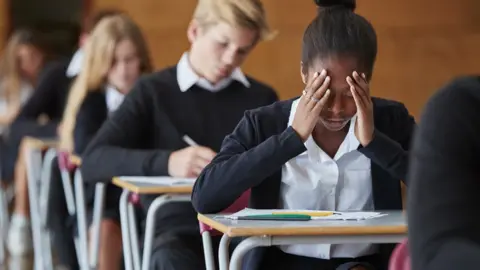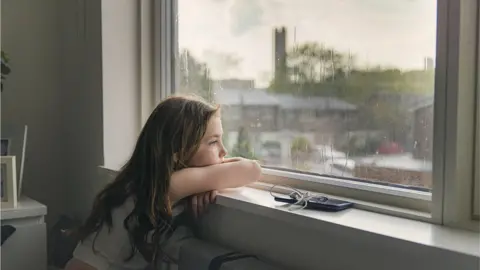Rise in pupils in NI with mental health issues in 2020
 Getty Images
Getty ImagesSchools reported greater numbers of pupils with mental health issues in 2020, some "directly related to lockdown".
That is according to just-published reports from the Education and Training Inspectorate (ETI).
The ETI reports analyse how schools were affected by the lockdown of March to June 2020 and the subsequent return of pupils from August to December.
They include evidence from schools and youth services.
In 2020, the vast majority of pupils in Northern Ireland were not in school between mid-March and the end of term in June.
Pupils returned to face-to-face teaching in school from August to December 2020.
 Getty Images
Getty ImagesThe ETI reports cover those periods, but do not cover the effect of the subsequent lockdown from January to March 2021 on pupils and staff.
Only special schools remained open for all pupils during that period.
A number of experts have previously warned of the "devastating effect" of the coronavirus pandemic on children.
The ETI reports are wide-ranging and show schools and their staff met many challenges, but include feedback from schools on pupil and staff well-being and mental health.
Post-primary schools "were dealing with a greater number of mental health matters, some of which were directly related to lockdown," the ETI said.
These included a "greater incidence of self-harm, anxiety and depression".
Schools also reported "increased cases of domestic violence" and "more young people taking on the role of carers as the health and social care system was not able to provide respite".
As a result, some schools said there needed to more "in-house" support for pupils' mental health.
"Absence of input on the ground from outside agencies, with support delivered online and longer waiting times for referrals put pressure on staff in schools across this time period," the ETI said.
The inspectorate said that pupils had missed out on practical work in some subjects, extra-curricular activities, development of social skills and work placements due to restrictions.
They also said the job of teachers had become "more complex and demanding".
Post-primary schools leaders also said pupils, parents and staff were concerned about how qualifications would be awarded in 2021.
Schools are to assess and calculate grades for pupils as summer exams have been cancelled.
 Getty Images
Getty ImagesIn primary schools, the ETI expressed concerns about the mental health of principals and other senior leaders.
There were also concerns for principals and leaders in special schools and pre-schools.
"While all reported feeling under pressure, a minority reported feeling overwhelmed and stated that the workload had impacted negatively on their work/home life balance and affected negatively their emotional health and wellbeing," the ETI said in the pre-school report.
While many primary schools had developed and improved remote learning for pupils there were also concerns that some aspects of the curriculum were made more difficult online.
These included "early language and reading skills, including the children's phonological awareness and application of phonics; the development of mathematical concepts; and, gross and fine motor skills".
"For many children in Irish-medium education and those who have English as an additional language, staff reported their early acquisition and subsequent development of Irish/English was impacted as a result of reduced exposure to the language during the period of lockdown."
'Mental health crises'
The ETI said that primary schools were also aware of a growing number of families who needed emotional or financial help.
"In response to a growing number of families in need and in mental health crises, schools have increased communication and engagement with local community partnerships and charities to support the needs of local families," the report said.
Youth workers also reported that they were spending more time trying to help families.
"Youth workers also reported on the increasing levels of poverty and the impact of this on young people and their families; they also highlighted that in these challenging situations much of their work involved supporting parents," the ETI said.
The ETI reports separately cover pre and primary schools, post-primaries, special schools, youth services and Education other than at School (EOTAS) centres.
